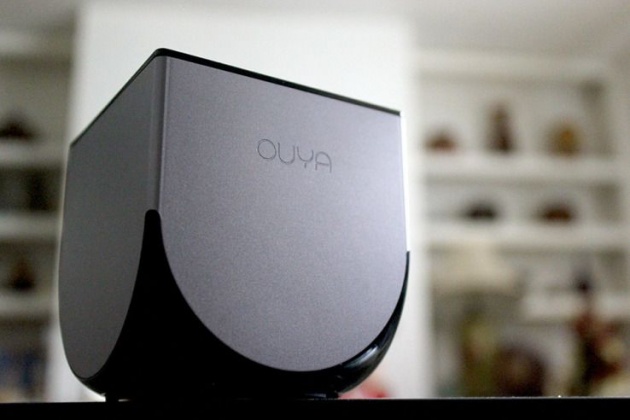
After raising funds at a $1 billion valuation, gaming company Razer has confirmed its first acquisition. It has bought the software assets of Ouya; and it has acqui-hired the company’s technical and developer relations teams to expand Razer’s Android TV gaming business, specifically around its Forge TV console and the Cortex gaming platform.
Notably, Razer is not acquiring the hardware part of Ouya’s business, specifically the microconsole and controller that helped make Razer’s name in the first place.
The terms of the acquisition have not been disclosed but “It was an all-cash deal,” Min-Liang Tan, founder and CEO of Razer, told TechCrunch. This means all Ouya’s VC investors have cashed out. But at least one — Alibaba, which put $10 million into Ouya earlier this year — will now be working more with Razer. (More on that below.)
Ouya CEO and co-founder Julie Uhrman will not be coming over to Razer as part the deal, Uhrman and Tan told TechCrunch, although both note that Uhrman supports the transition. She’s also been thanking lots of people for the last hour over Twitter for their support of the company.
Ouya had launched in 2012 with a console that raised over $8.5 million on Kickstarter, but all but stopped developing that part of the business in March 2014 after struggling to attract developers to build for it, and gamers to buy the kit.
Ouya still seems to be selling the devices at the time of writing. We have asked Uhrman if she can tell us what may be happening with the hardware and related IP, if anything.
Today’s announcement was a while in coming. The acquisition was first reported at thebeginning of June. And while the companies did not comment at the time, it was indirectly confirmed by Mesa, the investment bank that helped broker the deal. (In little twist, Mesa itself was acquired just last week.) Razer says the acquisition closed on June 12.
The deal will alternately involve integration and migration. Razer will be integrating Ouya’s games, controllers and accounts to its Cortex TV gaming platform, and will relaunch Ouya’s store as Cortex for Android TV. Tan tells TechCrunch that as of today, Razer’s software platform has “millions of users and over 2 million daily active gamers.” Ouya claims to be the world’s biggest Android TV console publisher, with more than 1,000 games, and the developer relations team will in part be working to keep building that business.
Razer will also be migrating Ouya’s 200,000 users over in the process, Tan tells TechCrunch, with about a year more of support for Ouya hardware and offers to try to get them to migrate over to Razer devices like the Forge TV microconsole and Serval controller bundle.
“There are about 200,000 users on the OUYA platform and for the hardware users, we intend to, out of goodwill (as we didn’t acquire the hardware assets), keep the lights on for their gaming service for at least 12 months as we encourage them to migrate to the Razer service which will have a lot more features, new content and new games,” he said. “We will have more follow up announcements soon on the transition to the new service.” Sweeteners will include “freebies, giveaways and promotions,” Razer noted.
Tan says that Razer will also be keeping the Ouya brand in part. “The Ouya brand name will live on as a standalone gaming publisher for Android TV and Android based TV consoles,” he said.
The deal marks the end of the line for Ouya as a standalone business after it burst into the world with a mission to expand Android gaming on the TV, and a record-breaking Kickstarter campaign to underscore popular interest in helping to make that happen.
“Ouya was created with the goal to give developers more freedom. In doing this, we created the first open platform for television. And, with more than 1,000 games, we offered more content — and a broader variety — than any other platform,” she emailed me in response to questions about the deal. “We are excited that Razer will expand our vision. While this was a hard trail to blaze, we proved that we could bring new thinking to how the games industry operates and we hope we have paved the way for others, allowing all game developers to bring his or her game to the big screen.”
But while competition against incumbents like Microsoft and Sony proved to be too challenging for Ouya, the shifts we’ve seen — precipitated by the rise of smaller and mobile computing devices and new experiences altogether — point to there being room for more players.
Razer, like Ouya, has been following a vertically-integrated route while building its business, investing not just in platforms to attract more software development but also in building arange of hardware that includes not just the Forge console but Blade gaming-optimized laptops, peripherals like controllers and keyboards, and wearables.
The idea is that Ouya will be able to help in both of those areas.
On the software side, Ouya had already been working with companies like Xiaomi and its Mi Box and Alibaba‘s TMall Box, and that will continue under its new owner as a way for Razer to expand the economies of scale of its bigger platform.
“Alibaba Group is committed to bringing high-quality games and content to our Chinese users. We look forward to continuing our collaboration with Ouya through Razer,” an Alibaba spokesperson told TechCrunch.
The Forge TV console, meanwhile, has had mixed reviews since launching earlier this year, with some pointing out that there are strong competitors both above and below its basic $100 price point and others ultimately concluding that it’s not bad, but buggy. Razer clearly is not ready to give up, though, so while it continues to develop the hardware is hoping for another software boost to the product by way of Ouya.
Prior to the sale, Ouya had raised $33.6 million with investors including Kleiner Perkins, Jay Adelson, Mayfield Fund, Nvidia, Occam Capital and Shasta Ventures. Razer, meanwhile, counts Intel Capital, IDG-Accel and Heliconia Capital Management (a subsidiary of Singapore’s Temasek) as investors.



